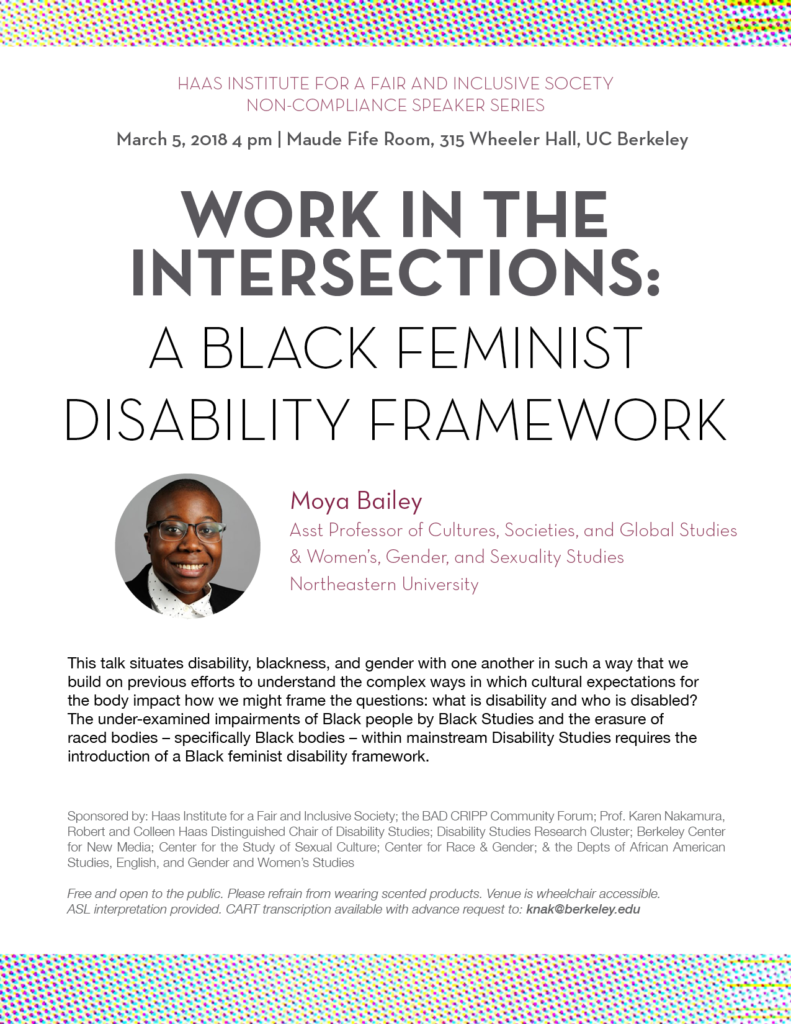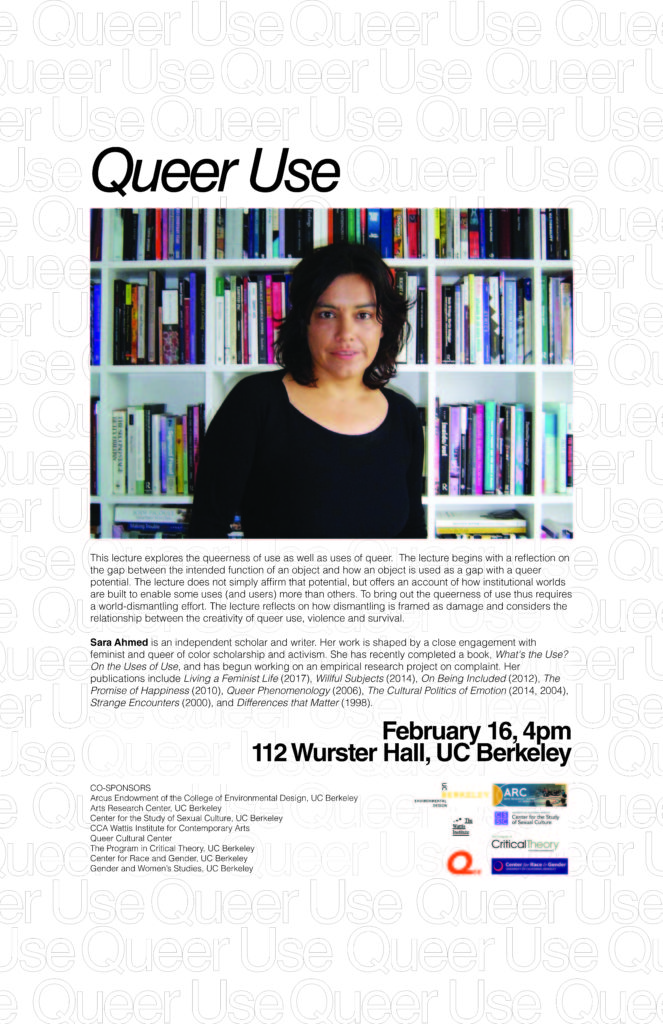2018
Ev’ry Body, This Time: A Sexuality Studies Conference Call for Papers – deadline extended to Feb 28
A conference free and open to the public hosted by the Center for the Study of Sexual Culture
University of California, Berkeley
April 12-14, 2018 at Sutardja Dai Hall on the U.C. Berkeley campus
Berkeley, California
For most recently updated information please visit cssc.berkeley.edu
The submission deadline has been extended to Feb 28th, with rolling decisions announced.
Conference Description
“Ev’ry Body, This Time.” The elision in ev’ry gestures in multiple ways: to the bodies that have been exempted in various iterations of sexuality studies, and to our quixotic desire to (re-)emplace them. It refers as well to the shifting and ever-proliferating fact of bodies: the way that apparent gaps may not represent incompleteness, but point instead to troubled standards of perceiving or evaluating wholeness; that filling a gap can thus provisionally flesh out bodies that are at once legible and illegible. Race and gender, in their mutable complexities, sit at the core of these questions. Our apostrophe calls to a multitude of bodies, recognizing the potential for thinking through, substituting, re-visioning, and, ultimately, holding space for, bodies that exceed categorical legislation and rhetorical disciplinarity. We also note that embodiment is not everyone’s cup of tea. We flag the body, ev’ry body, because sensuousness has too often been left out of considerations of sexuality and politics. Simultaneously, we wonder how given languages about sex and meaning work in relation to disability, debility; in the realm of the digital; under the aegis of asexuality?
This Time means both that we view this as a conference that belongs to a history of academic conferences in queer studies and that we view this as a conference that is happening in a perilous present moment. How is the critical study of sexuality evolving and in response to what imperatives? What is the relation of this time to other times (and places) and how are the particular urgencies of this time tied to other moments? Is the critical study of sexuality always explicitly about sexuality, now?
In conjoining Ev’ry Body and This Time, we issue a challenge (one with a dash of utopianism in it) to ourselves and to the conference participants: What future do “we” want looking forward from where we stand?
The conference will feature both panels assembled in response to an open call for abstracts, as well as invited speakers who currently include: Qwo-li Driskill, Alison Kafer, Amber Musser, Gemma Romain, Nayan Shah, Amy Sueyoshi, Omi’seke Natasha Tinsley, Qian Wang, Gloria Wekker, and more to be confirmed, alongside workshops and other conference events. Please check cssc.berkeley.edu for further announcements concerning the call for papers and abstract submission, accessibility information, and reserving a spot for attendees.
Submission email (submissions only): csscconf2018@gmail.com
Please direct all inquiries to cssc@berkeley.edu
Besides providing wheelchair access, this event aims to be broadly accessible, including practices of both disability and gender accessibility.
Abstract Submission Requirements:
We encourage submissions from scholars, artists, activists both working within institutions and organizations, as well as independently.
Single paper abstracts should be 300-500 words in length. Accepted papers will be arranged into panels. Include a bio or CV.
Panel submissions should total 750-1000 words. Panels may include 3-4 people. Please include a 250 word abstract of your panel theme, and include substantial descriptions of each paper. Accepted panels will be assigned chairs or respondents from the U.C. Berkeley host community; please note any special requests thereof. We encourage panels to have a diversity of institutional representation and also of membership: graduate students, faculty, and independent artists/scholars/activists. Include a bio or CV for each speaker.
The submission deadline has been extended to Feb 28th, with rolling decisions announced. Submissions must be sent to the dedicated email address csscconf2018@gmail.com (submissions only) in order to be considered. We aim to respond to proposals by February 15, 2018. Please direct any inquiries about submissions or the conference to cssc@berkeley.edu.
Affordability: The conference is free to all, but we understand that traveling to a conference can be prohibitively costly. To help defray costs of staying in the Bay Area, we will be organizing a limited number of informal housing possibilities (free couch shares) in addition to providing suggestions for local hotels. The location of the conference is near several campustown districts that offer a variety of dining options, many of which include dietary options.
Work in the Intersections: A Black Feminist Disability Framework
This talk situates disability, blackness, and gender with one another in such a way that we build on previous efforts to understand the complex ways in which cultural expectations for the body impact how we might frame the questions: what is disability and who is disabled? The under-examined impairments of Black people by Black Studies and the erasure of raced bodies – specifically Black bodies – within mainstream Disability Studies requires the introduction of a Black feminist disability framework. By employing a Black feminist disability framework, scholars of African American and Black Studies, Women’s, Gender, and Sexuality Studies, and Disability Studies have a flexible and useful methodology through which to consider this historical, social, cultural, political, and economic reverberations of disability for Black disabled people. This talk is based on a forthcoming article co-authored by Moya Bailey and Izetta Mobley.
Dr. Moya Bailey is Assistant Professor of Cultures, Societies, and Global Studies and of Women’s, Gender, and Sexuality Studies at Northeastern University. Her work focuses on Black women’s use of digital media to promote social justice as acts of self-affirmation and health promotion. She is interested in how race, gender, and sexuality are represented in media and medicine. She currently curates the #transformDH Tumblr initiative in Digital Humanities (DH). She is a monthly sustainer of the Allied Media Conference, through which she is able to bridge her passion for social justice and her work in DH. She is the founder and co-conspirator of Quirky Black Girls, a network for strange and different black girls, and now serves as the digital alchemist for the Octavia E. Butler Legacy Network (http://octaviabutlerlegacy.com/). Her co-authored book #HashtagActivism: Race and Gender in America’s Network Counterpublics is forthcoming from MIT Press in 2019, and she is completing another book titled Contesting Misogynoir: Black Women’s Digital Resistance in U.S. Culture.
Sponsored by: Haas Institute for a Fair and Inclusive Society; the BAD CRIPP Community Forum; Prof. Karen Nakamura, Robert and Colleen Haas Distinguished Chair of Disability Studies; Disability Studies Research Cluster; Berkeley Center for New Media; Center for the Study of Sexual Culture; Center for Race & Gender; & the Departments of African American Studies, English, and Gender and Women’s Studies
Please refrain from wearing scented products. Venue is wheelchair accessible. ASL interpretation provided. CART transcription available with advance request to: knak@berkeley.edu
facebook event page: https://www.facebook.com/events/970972043054748/
Queer Use
Join us for a talk on Queer Use with renowned scholar Sara Ahmed on February 16 at 4:00 pm, 112 Wurster Hall. The lecture is free and open to the general public.
We will also be hosting a conversation with Professor Ahmed for graduate students only. Please contact CSSC to RSVP for the graduate student conversation at cssc@berkeley.edu.
Queer Use
This lecture explores the queerness of use as well as uses of queer. The lecture begins with a reflection on the gap between the intended function of an object and how an object is used as a gap with a queer potential. The lecture does not simply affirm that potential, but offers an account of how institutional worlds are built to enable some uses (and users) more than others. To bring out the queerness of use thus requires a world-dismantling effort. The lecture reflects on how dismantling is framed as damage and considers the relationship between the creativity of queer use, violence and survival.
Sara Ahmed is an independent scholar and writer. Her work is shaped by a close engagement with feminist and queer of color scholarship and activism. She has recently completed a book, What’s the Use? On the Uses of Use, and has begun working on an empirical research project on complaint. Her publications include Living a Feminist Life (2017), Willful Subjects (2014), On Being Included (2012), The Promise of Happiness (2010), Queer Phenomenology (2006), The Cultural Politics of Emotion (2014, 2004), Strange Encounters (2000), and Differences that Matter (1998).
This event is co-sponsored by:
Arcus Endowment of the College of Environmental Design, UC Berkeley
Arts Research Center, UC Berkeley
Center for the Study of Sexual Culture, UC Berkeley
CCA Wattis Institute for Contemporary Arts
Queer Cultural Center
The Program in Critical Theory, UC Berkeley
Center for Race and Gender, UC Berkeley
Gender and Women’s Studies, UC Berkeley


